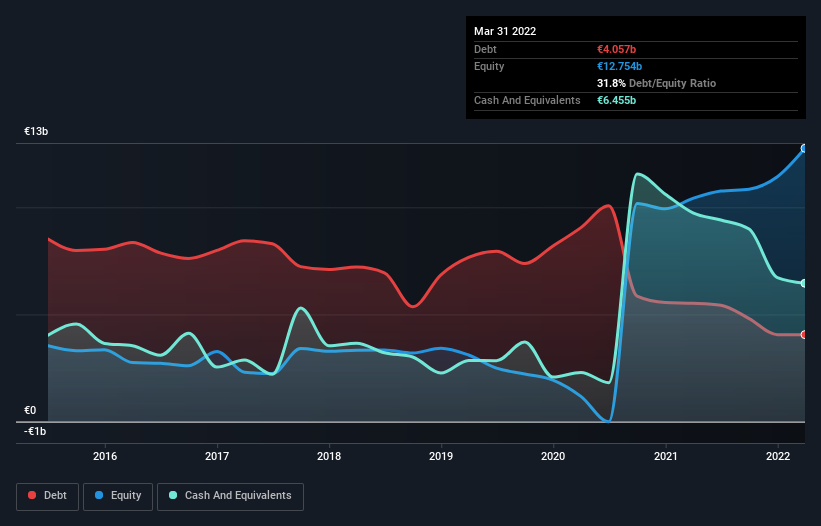
The external fund manager backed by Berkshire Hathaway's Charlie Munger, Li Lu, makes no bones about it when he says 'The biggest investment risk is not the volatility of prices, but whether you will suffer a permanent loss of capital.' So it might be obvious that you need to consider debt, when you think about how risky any given stock is, because too much debt can sink a company. As with many other companies thyssenkrupp AG (ETR:TKA) makes use of debt. But the real question is whether this debt is making the company risky.
When Is Debt A Problem?
Debt is a tool to help businesses grow, but if a business is incapable of paying off its lenders, then it exists at their mercy. Part and parcel of capitalism is the process of 'creative destruction' where failed businesses are mercilessly liquidated by their bankers. However, a more common (but still painful) scenario is that it has to raise new equity capital at a low price, thus permanently diluting shareholders. By replacing dilution, though, debt can be an extremely good tool for businesses that need capital to invest in growth at high rates of return. When we think about a company's use of debt, we first look at cash and debt together.
View our latest analysis for thyssenkrupp
How Much Debt Does thyssenkrupp Carry?
You can click the graphic below for the historical numbers, but it shows that thyssenkrupp had €4.06b of debt in March 2022, down from €5.52b, one year before. But on the other hand it also has €6.46b in cash, leading to a €2.40b net cash position.

A Look At thyssenkrupp's Liabilities
According to the last reported balance sheet, thyssenkrupp had liabilities of €12.8b due within 12 months, and liabilities of €10.7b due beyond 12 months. Offsetting this, it had €6.46b in cash and €7.12b in receivables that were due within 12 months. So it has liabilities totalling €10.0b more than its cash and near-term receivables, combined.
This deficit casts a shadow over the €5.68b company, like a colossus towering over mere mortals. So we'd watch its balance sheet closely, without a doubt. After all, thyssenkrupp would likely require a major re-capitalisation if it had to pay its creditors today. Given that thyssenkrupp has more cash than debt, we're pretty confident it can handle its debt, despite the fact that it has a lot of liabilities in total.
Although thyssenkrupp made a loss at the EBIT level, last year, it was also good to see that it generated €1.5b in EBIT over the last twelve months. There's no doubt that we learn most about debt from the balance sheet. But ultimately the future profitability of the business will decide if thyssenkrupp can strengthen its balance sheet over time. So if you want to see what the professionals think, you might find this free report on analyst profit forecasts to be interesting.
Finally, a business needs free cash flow to pay off debt; accounting profits just don't cut it. thyssenkrupp may have net cash on the balance sheet, but it is still interesting to look at how well the business converts its earnings before interest and tax (EBIT) to free cash flow, because that will influence both its need for, and its capacity to manage debt. Over the last year, thyssenkrupp saw substantial negative free cash flow, in total. While that may be a result of expenditure for growth, it does make the debt far more risky.
Summing up
Although thyssenkrupp's balance sheet isn't particularly strong, due to the total liabilities, it is clearly positive to see that it has net cash of €2.40b. Despite the cash, we do find thyssenkrupp's level of total liabilities concerning, so we're not particularly comfortable with the stock. When analysing debt levels, the balance sheet is the obvious place to start. But ultimately, every company can contain risks that exist outside of the balance sheet. Case in point: We've spotted 3 warning signs for thyssenkrupp you should be aware of, and 2 of them are a bit unpleasant.
If, after all that, you're more interested in a fast growing company with a rock-solid balance sheet, then check out our list of net cash growth stocks without delay.
New: Manage All Your Stock Portfolios in One Place
We've created the ultimate portfolio companion for stock investors, and it's free.
• Connect an unlimited number of Portfolios and see your total in one currency
• Be alerted to new Warning Signs or Risks via email or mobile
• Track the Fair Value of your stocks
Have feedback on this article? Concerned about the content? Get in touch with us directly. Alternatively, email editorial-team (at) simplywallst.com.
This article by Simply Wall St is general in nature. We provide commentary based on historical data and analyst forecasts only using an unbiased methodology and our articles are not intended to be financial advice. It does not constitute a recommendation to buy or sell any stock, and does not take account of your objectives, or your financial situation. We aim to bring you long-term focused analysis driven by fundamental data. Note that our analysis may not factor in the latest price-sensitive company announcements or qualitative material. Simply Wall St has no position in any stocks mentioned.
About XTRA:TKA
thyssenkrupp
Operates as an industrial and technology company in Germany and internationally.
Flawless balance sheet and undervalued.
Similar Companies
Market Insights
Community Narratives



